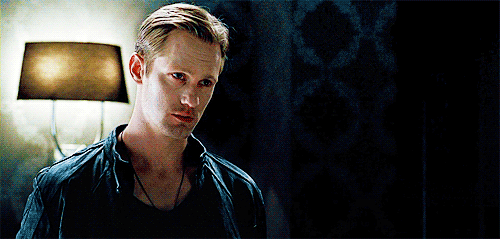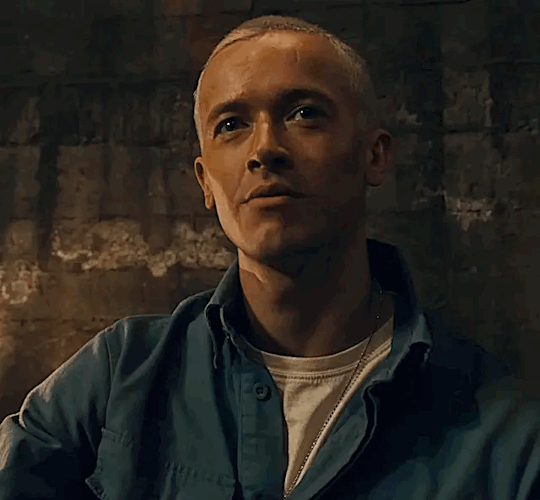Don't wanna be here? Send us removal request.
Text
Vedic Astrology Observations
Mars Dominant Men

(GIF context: The gif shows Mars Dominant Jim Carrey [Mrigashira Moon and Dhanishta Ketu] being extra, which is what he is known for. The other video is just shear chaos that I think is demonstrative of Mars energy at its most energetic and undeveloped. Just... watch it, and you will see.)
youtube
Mars, known as "Mangal" in Vedic astrology, is the general of the army of gods. It is a symbol of dynamism and excitability, embodying the essential forces of ambition, anger, and action. In Vedic astrology, Mars plays an important role in reinforcing principles related to assertiveness and drive. The placement of Mars in an individual's kundli (birth chart) is indicative of where energy is most actively expressed and channeled, often linked to pursuits involving motivation, courage, combat, and conquest. Additionally, Mars governs the domains of passion and sexuality, overseeing primal instincts of desire and attraction, thereby significantly influencing sexual drive, romantic pursuits, and the broader expression of fervor, which includes violence and cruelty. In the context of relationships and sexuality, Mars' placement in the birth chart can reveal an individual's approach to sexual matters, assertiveness in romantic endeavors, and physical intimacy. The influence of Mars also extends beyond physical exertion as well, as it similarly encapsulates broader concepts of mental initiative and the cognitive drive necessary to achieve goals and overcome obstacles. Mars is not a one-dimensional force; while it represents the essential pursuit we all need to get things done, it also signifies potential conflict, impulsivity, and a propensity for brashness. Like fire, Mars's energy can both forge and destroy, serving as a tool for constructive purposes or leading to destruction if not properly managed. This complex nature of Mars highlights the importance of balance and control in harnessing its power. The journey of Mars in one's life is that of a warrior's path, necessitating not only the wielding of power but also an understanding of its consequences and the judicious use of such force. The process of learning to balance and direct one's energies appropriately is central to the teachings of Mars, making its influence important for personal growth, self-understanding, and the realization of one's potential.
Mars, within the framework of Vedic astrology, wields a significant influence on an individual's personality and life direction, something that becomes especially pronounced in natives with prominent placements in Mars-ruled nakshatras like Mrigashira, Chitra, and Dhanishta. Investigating Mars' astrological impact provides an opportuned look into the inherent characteristics, life paths, and challenges of those under its primary influence, particularly regarding its astrological significations as they manifest in the real world. The presence of a dominant Mars in an astrological chart typically results in a personality distinguished by ambition, assertiveness, and a pronounced expression of will. Although these traits can be observed in both genders, they tend to be more conspicuous in Mars-dominant men. This is a bit unrelated, but I would recommend that, for all astrological endeavors, you should be able to see the influence of astrology in people's' lives, and that should roughly align with the significations of the energy behind the different signs, planets, houses etc. Astrology is true beyond self-reflection. It is the essence of life and the universe itself and establishes a oneness to all things that can be observed even in and beyond material world.
Anyway, Mrigashira Nakshatra, often referred to as the birthplace of Mars, is where the planet's energy is expressed most vibrantly and potently. Symbolized by a deer, this nakshatra embodies an inherent restlessness and a relentless quest for chasing after something. It represents qualities like agility and grace, mirroring the inherent qualities of Mrigashira individuals, such as quick intellect, adaptability, and a certain delicateness in their approach to life and relationships. The ruling deity of Mrigashira, Soma, the Moon God, adds to this Nakshatra a layer of emotional depth and intuitive insight that complements its inherent restlessness and quest for knowledge. Soma's influence brings a nurturing and reflective quality to the vibrant and potent energy of Mars, softening the aggressive pursuit with a touch of gentleness. When Mrigashira falls in Taurus, co-ruled by Venus, this brings in elements of sensuality, aesthetics, and a deeper connection to the material and sensual world. The influence of Venus enhances the allure and charm inherent in the deer symbolism, adding a dimension of beauty and attraction to the restlessness and curiosity driven by Mars. Conversely, when Mrigashira is in Gemini, co-ruled by Mercury, the focus shifts more towards communication, intellect, and a mercurial nature of being skilled. The deer's symbolism here aligns with agility not just in physical movement but in mental acuity as well. The connection of Mar's and Mercury's influence on this Nakshatra infuses these individuals with a sharp wit, a capacity for rapid intellectual processing, and an insatiable curiosity about the world around them. Together, the influence of both Taurus and Gemini are combined to make up this cusp Nakshatra as a whole, blending qualities of each for those born under it. Individuals with significant placements in Mrigashira are marked by intense curiosity and a dynamic spirit, leading to a restlessness that transcends the physical, spurring a constant pursuit of knowledge and unfettered thoughts. Their minds are agile and adaptable, producing a versatile and energetic approach to life. However, this can sometimes result in an overwhelming influx of thoughts, necessitating continuous physical/mental stimulation and a penchant for novelty to keep them quiet. In relationships, their charismatic and dynamic nature is alluring, yet their constant craving for change can challenge the stability and depth of these connections. Professionally, they excel in roles that demand innovation, quick thinking, and adaptability. Additionally, with Mars' association with sex and desire, the birth of Mars in this nakshatra intertwines with the genesis of desire and the inherent chase in seduction, shown in its natives as being either "hard to get" or relentless in their pursuit of another. The symbolism of the deer in this nakshatra resonates with this quality of desire and chase as it relates to innocence and allure, reflecting the dual aspects of seduction as both a playful and deeply carnal force.
(GIF contexts: The first gif shows Hugh Jackman [Mrigashira Moon, Chitra Sun and Chitra Mercury – I also thought I should mention he has Shravana ascendant {moon and saturn-ruled nak, while not moon dominant, the aspects in my moon-dominant post will still somewhat apply to him, since ascendant is a very important placement}, which introduces an aspect of discipline that I talk about a little later]. He is dancing while sitting. The second shows Armie Hammer who is jointly Ketu and Mars Dominant [Mrigashira Moon, Chitra Venus and Ketu / Magha Sun and Mercury]. As a side note, Armie Hammer played in Call Me By Your Name with Timothee Chalamet who is Joint dominant with Ketu and Jupiter, which is interesting considering Mars is one of the most compatible with Jupiter. The third shows Lionel Messi who is mix of Mars and Moon again [Mrigashira Moon, Chitra Midheaven / Shravana Asc and Rohini Venus])



Chitra Nakshatra, symbolized by a bright jewel, epitomizes the fusion of creativity and allure. This nakshatra, much like a finely cut gem, reflects the qualities of precision, intricacy, and brilliance. Chitra Nakshatra, under the guardianship of Tvashtar or Vishwakarma, the divine architect and cosmic craftsman, radiates the essence of creative brilliance and aesthetic perfection. The influence of this deity gives Chitra natives a blend of artistic talent and a keen eye for details, mirroring Tvashtar's role in shaping the universe with precision and creativity. They can be some of the most expansive when it comes to world-building, almost to the point where it becomes disturbing how far into detail they will go. The symbol of Chitra being a bright jewel perfectly encapsulates the splendor and allure that Tvashtar imparts to these individuals, fostering an affinity for harmony, design, and the finer things in life. When Chitra falls in Virgo, co-ruled by Mercury (possibly Ceres), the focus is on the meticulous and analytical aspects, mirroring the precise and careful crafting of a jewel. This placement accentuates the intellectual and detailed-oriented facets of creativity, similar to the skilled artisanship in gem cutting. Conversely, in Libra, co-ruled by Venus, Chitra's energy shifts towards the aesthetic, the harmonious, and the beautiful aspects of a jewel's allure. In this sign, the emphasis is on artistic expression, sensory appreciation, and the creation of visual harmony, aligning with Venus's influence on Chitra's inherent Mars-driven dynamism. The symbolism of the jewel in Chitra thus resonates with the attributes of detail, thoughtfulness craftsmanship, and aestheticism, making this cusp Nakshatra very similar but different to its less developed predecessor. Individuals with significant placements in Chitra are known for their artistic sensibility and charm, often drawn to professions where creativity and aesthetics hold sway. Their pursuit of beauty drives them towards perfectionism in various life aspects, from art and design to personal expression, much like a jewel being chiseled to display harmony and beauty. However, this pursuit can sometimes lead to a performative aspect in their expressions, prioritizing appearance over substance. The fiery energy of Mars in this nakshatra can manifest as a combative trait, fueling their dynamic approach to life but also leading to conflicts when ideals of perfection meet less polished realities. The symbolism of the jewel in Chitra reflects a balance between brilliance and fragility, much like a precious stone: captivating, yet susceptible to cracking under pressure. Additionally, Mars adds a layer of passion to their artistic endeavors and romantic pursuits, modifying the expression of Mercury and Venus with an added layer of intensity. This might extend to all Mars men, but Chitra tends to really emphasize the smile.
(GIF contexts: First one shows Joseph Morgan [Chitra Moon]. The second shows Jude Law [Chitra Moon]. The third is John Krasinski [Chitra Sun and Moon with Mrigashira Ascendant])



Dhanishta Nakshatra shows Mars in its most sophisticated, refined form, particularly dominating in aspects of masculine sexuality and spirituality. Presided over by the Vasus, the eight elemental gods in Vedic mythology, this nakshatra emulates the virtues of wealth, generosity, and musicality. This celestial domain gives its natives the essence of resourcefulness, resilience, and a connection to the natural and cosmic elements as symbolized by the drum, encapsulating rhythm, charisma, and the very pulse of life. Co-ruled by Saturn and straddling the cusp of Capricorn and Aquarius, Dhanishta harmonizes the discipline of Saturn with the vigor of Mars, captivating others with its endurance, charisma, and a refined spiritual power. The significance of Mars being exalted in Capricorn plays an important role in the expression of Dhanishta Nakshatra. Mars' exaltation in this Nakshatra at the 28º of Carpcorn signifies the planet's optimal expression of discipline, determination, and the ability to achieve goals with focused energy. This exaltation enhances Dhanishta's traits, giving individuals a formidable ability to channel Mars' dynamic force constructively and with purpose. The balance of Mars' raw energy and Saturn's structured approach in Dhanishta translates to a sophisticated handling of power, a relentless drive for achievement, and an alignment with a sense of purpose. This blend of Mars' exalted qualities in tandem with saturn leads to a unique amalgamation of strength, resilience, and responsibility, albeit with the potential for emotional extremes and a tendency toward depressive states. While Dhanishta engenders purpose and strength, it can cause emotional fluctuations and a tendency towards depressive as well as over-excitable states. The highs of Mars' fiery energy can swiftly transition to the lows of Saturn's cold and somber disposition, creating a challenging oscillation between the two extremes. In their personal lives, the Dhanishta native's need for energy and control, amplified by intense sexual energy, can complicate relationships, leading to a cycle of passionate engagements followed by phases of solitude and detachment. This pattern, often observable in the lives of many Dhanishta natives, can result in a disconnect from one's authentic self and meaningful relationships. Furthermore, the Saturnine influence in Dhanishta brings an enhanced sense of duty, which, coupled with Mars' ambition and focus on male sexuality, often culminates in a relentless pursuit of success and a desire to satisfy the male ego, sometimes at the cost of personal health and well-being. Acknowledging the features of Mars in this Nakshatra is especially important as it reaches its maturity at age 28, when these themes become more pronounced for those under its strong influence. Individuals with prominent placements in Dhanishta often have a lustrous personality and a commanding presence, qualities that often thrust them into the public sphere. Their charisma and appeal are rooted not just in external factors but emerge from a deep sense of self-assuredness and a vigorous inner life. These people may also become overly-involved with their work to the point where it adversely affects their health, so that is another thing to keep in mind.
(GIF contexts: The first one shows Ashton Kutcher [Dhanishta Sun, Moon, and Venus -- possibly also Mrigashira Asc]. The second one shows Aaron Taylor Johnson [Dhanishta Sun and Mrigashira Moon.] The third shows Nicholas Cage [Chitra Moon and Dhanishta Saturn with Venus])



Mars-dominant men are characterized by their complex and intense personalities, significantly shaped by the dynamic energy of Mars. This influence is evident in a range of behaviors, including assertiveness, vitality, and notable physical expressiveness, which are often juxtaposed with a distinctive emotional sensitivity and a tendency towards irritability. Such a combination frequently leads to a heightened level of emotional reactivity, predisposing them to sudden outbursts or intense responses to both physical and emotional stimuli. These reactions can sometimes seem erratic or disproportionate, emerging unexpectedly and potentially being perceived as a lack of emotional regulation. This aspect of their personality may come across as somewhat childish, marked by a lack of control in emotional expression. For example, they might exhibit an exaggerated reaction to minor annoyances, such as becoming excessively upset when disturbed, demonstrating an almost melodramatic response to scenarios that others might approach with greater composure. However, this same intensity of emotion can also manifest as a form of strength and fervor. Their copious energy often channels itself into various activities that capture their interest, leading to deep immersion in these pursuits. For instance, their engagement with a book might become so absorbing that they forsake any plans they have for the day, opting instead to consume the entire thing in a single session. This characteristic illustrates their capacity for exaggerated involvement in activities they find are passionately interested in, reflecting the significant impact of Mars' energy on their concentration and enthusiasm. This deep involvement can be both a source of fulfillment and, at times, a challenge, as their intense focus might lead them to overlook other aspects of their lives. Understanding and managing this potent Mars influence is key to harnessing its strengths while mitigating its potential downsides.
Mars-dominant men, driven by this planet's passionate and energetic influence, often gravitate towards activities that demand physical exertion and pose a challenge. This preference can take various forms, from athletic activities to spontaneous physical actions, some of which may be seen as unconventional or particularly intense. These men are typically drawn to extreme sports or activities that stimulate adrenaline, reflecting their desire for excitement and a drive to test their limits. Their approach to these activities is characterized by an intensity and a readiness to embrace risks, mirroring the unrestrained energy of Mars. While they generally may not favor disciplines like weightlifting or bodybuilding, which require a level of sustained discipline that contrasts with their inclination for sporadic bursts of energy more familiar to mars, a more refined expression of Mars, such as through Dhanishta Nakshatra, might lead them to engage in physical activities that incorporate a more structured approach. In addition to these pursuits, Mars-dominant men might also find a strong interest in the military or related fields, aligning with Mars' traditional association with warfare and combat. The disciplined structure, physical demands, and the inherent challenges of military life resonate with the Mars-driven need for a dynamic environment and the opportunity to demonstrate courage and strength. This attraction to the military or tactical fields can be seen as an extension of their adventurous spirit and their propensity to engage in activities that test their physical and mental fortitude. The discipline and order of military life provide a constructive outlet for their Mars-driven energy, channeling their inclination for risk-taking and physical exertion into a structured and purposeful framework. This interest in military pursuits or related activities not only aligns with the martial qualities of Mars but also allows these individuals to find a sense of fulfillment and accomplishment in an environment that values and nurtures their inherent traits and abilities. In daily life, their spontaneous physical behavior is also noticeable. Mars-dominant men might exhibit impulsive reactions, such as sprinting to catch a bus, suddenly engaging in a random dance, or displaying various forms of physical restlessness like tapping or bouncing their legs. These actions, although demonstrating their physical vitality, can sometimes be surprising or even disconcerting to others due to their intensity and the unexpected nature of these bursts of energy. This unpredictability, coupled with their physical prowess, can sometimes induce apprehension in those around them, stemming from a perception of a lack of control. This physical expressiveness is integral to their nature, providing a means to manifest Mars' fiery energy in a visible and impactful way that is hard to temper. Whether through structured sports or in spontaneous acts, their physicality is a crucial channel for their passion and energy, significantly shaping their interactions with and experiences of the world around them.
(GIF context: The first shows Charles LeClerc [Chitra Sun and Mercury – He also has prominent Ketu but not enough for me to consider that a joint-dominant.] The second shows Antony Starr [Chitra Sun and Mrigashira Moon.] The third is Aaron Paul [Chitra Moon.])



In social settings, Mars-dominant men often exhibit a dichotomous behavior. Outwardly, they may present a reserved and polite persona because they wish to carefully curate their public image driven by a desire to be liked and admired and experience anxiety surrounding their inability to control their energy. However, this external calmness often conceals an inner whirlwind of energy and a combative intensity. Despite their efforts to appear controlled and composed, their interactions can unpredictably shift into provocative realms, especially in environments where they feel supported or defended by their social circle, or where they are otherwise at east. They may engage in boundary-pushing behaviors, rule-breaking, or ignite debates, just to elicit reactions that energize them and test the limits of others. This inclination to provoke and challenge is deeply ingrained in their nature, influenced by Mars' inherent provocativeness, which can be both physical and mental. When in the company of those they are comfortable with, their behavior can vary dramatically, shifting from polite and composed to passionately arguing about a complex political issue, for instance. This stark contrast between their almost shy, reticent demeanor and a more tumultuous, uninhibited side (which they often try to conceal) is a direct reflection of their internal struggle to reconcile Mars' fiery influence with societal norms and expectations. This struggle is alike to the effects of an imbalance in testosterone – rather than a balanced hormonal state that encourages virility and self-control, the Mars energy resembles the effects of excessive energy, where increased strength and irritability are coupled with unpredictability and a paradoxically stunted yet uninhibited sexual nature. Their social journey is thus characterized by navigating the fine line between innate Mars-driven impulses and the external social dynamics they aim to navigate. This ongoing internal conflict shapes their social interactions, influencing not only how they are perceived by others but also their self-perception. The challenge for Mars-dominant men lies in finding a way to harness their intense Mars energy constructively, without succumbing to its more disruptive tendencies. This balancing act is central to their personal growth and their ability to form meaningful and stable relationships in their social environments.
Mars-dominant men often exhibit an accentuated display of traditional masculine traits, influenced in part by their internalization of Mars' energy, which they frequently associate with conventional notions of masculinity and male sexuality. This can lead to an overemphasis on attributes such as stoicism and dominance, which are viewed as ideals to be aspired to. At the same time, there is often a tendency to devalue or even disdain traits traditionally considered feminine, such as emotional expressiveness, vulnerability, or gentleness. This behavior, albeit somewhat paradoxical given their own emotional intensity/sensitivity, reflects their struggle to balance their intense Mars-driven energy with societal perceptions of gender roles. It's important to note that these tendencies can be moderated by more feminine influences in their astrological chart, but generally, this is a prevalent pattern that is based on their usual harsh dealings with women. In terms of physical contact, Mars-dominant men typically exhibit a guarded approach. They are intensely protective of their personal space and can react strongly to unsolicited physical interactions. This protective stance is not merely a preference but part of their personality, rooted in a need to maintain control over their physical boundaries to avoid lashing out. However, this respect for personal space may not consistently apply to others. Their occasional disregard for others' personal boundaries can manifest in social settings, though this is often mediated by their desire to be perceived positively. This contradiction highlights another aspect of their complex nature, where the desire for personal autonomy coexists with a less pronounced respect for the autonomy of others. The challenge for Mars-dominant men exists in understanding and respecting the balance between asserting their own boundaries and acknowledging those of the people around them, navigating this aspect of their personality with awareness and sensitivity without compromising their values.
The complexity inherent in Mars-dominant men extends from their personal attributes into their intellectual and relational domains. They often hold complicated perspectives on various subjects, stemming from their willingness to engage with initially challenging ideas to gain a more objective perspective. This intellectual curiosity leads them to explore different sides of an argument, not just for the sake of learning how to refute the side they disagree with, but to substantiate their viewpoints with well-rounded research, reveling in the satisfaction of being "right" with multiple sources to back their claims (keep in mind, that is just one expression of mars. Sometime's mars individuals will just argue for the sake of arguing because it makes them feel good from the adrenaline). This love for intellectual depth is also evident in their approach to relationships. Mars-dominant men are attracted to partners who provide mental stimulation and wish to engage them on various levels – intellectually, emotionally, and physically. They value complexity and depth in their partners, seeking out relationships that offer open, thought-provoking dialogue. But beyond that, they want to be the center of attention in their relationships. These men desire a partner who can take charge and perhaps even educate them, not in a sense of having to be taken care of, but in a dynamic of expecting to be the better one in the relationship to guarantee their security. They enjoy delving into philosophical or abstract discussions, finding pleasure in the mental gymnastics such conversations provide. Consequently, they often avoid relationships that appear superficial or lack intellectual substance. The exception can be found in individuals with a strong Chitra influence, who might seek a balance that includes both depth and external perfection, sometimes even at the cost of authenticity. Regarding their relationship dynamics in terms of expression, Mars-dominant individuals can be either passive or dominant, influenced by their partner's disposition. A more assertive partner tends to bring out their passive side, whereas a more submissive partner tends to elicit a more dominant aspect in them. This adaptability is partly due to Mars' gender-neutral nature in its birth nakshatra, Mrigashira, which allows for a fluidity in their relational interactions but an adherence to traditional gender roles. This flexibility enables them to harmonize with various partner dynamics, adjusting their approach based on the energy and personality of their counterpart, ultimately seeking a balance that satisfies their complex nature, which can be a challenge for most of them.
GIF contexts: The first shows Eminem [Dhanishta Moon and Chitra Sun]. The second shows Ben Shapiro [Mrigashira Moon.] The third shows Alex Jones [Chitra Moon and Dhanishta Sun with Jupiter.])



I think it is necessary to include that, while exhibiting behaviors that align with traditional masculinity and occasionally underappreciating feminine traits, Mars men are not typically overt misogynists. Their inclination towards activities and behaviors often seen as masculine can inadvertently draw in those with more extreme views on gender roles, such as certain friends or fans. However, this association should not be seen as a direct reflection of the personal beliefs or attitudes of Mars-dominant men themselves (One could argue guild by association, but that is not my call). In fact, contrary to subscribing to misogynistic views, many Mars-dominant men possess a deep respect and admiration for strong, independent women. They often challenge patriarchal norms that subjugate women, such as the notion that women's desirability diminishes with age or that women should be perceived as delicate and in need of male protection. Instead, they find strength, intelligence, and maturity in women attractive, indicating a more progressive and equitable view of gender. This perspective on gender highlights the complex influence of Mars in shaping their personalities. Just because Mars-dominant men may naturally gravitate towards pursuits traditionally labeled as "masculine" and may struggle at times with the expression of various traits, their core beliefs about gender often embrace a more nuanced understanding, appreciating strength and assertiveness regardless of gender. Recognizing this aspect of their personality is key to gaining a clearer understanding of Mars-dominant individuals, revealing a facet of these individuals that goes beyond surface-level interpretations of their actions and associations.
90 notes
·
View notes
Text
Vedic Astrology Observations
Ketu Dominant Men

(GIF context: This GIF shows Jamie Dornan [Magha Moon] in 50 Shades of Grey, which has heavy themes of both Ketu and Mercury– Magha and Ashlesha.)
Ketu or "Chaya Graha", envisaged as the dragon's tail or a headless form, is a symbol of the utmost spiritual significance in Vedic astrology. It is the shadow planet representative of the South Node of the Moon, and it has the most significant karmic role. Ketu represents the process of spiritual growth that comes from isolation, detachment, and renunciation. Through the immersion of intuition and ascetic practices, Ketu facilitates the shedding of life's illusions and aids in the journey towards spiritual enlightenment, demonstrating how its influence tends to embody the more complex and often challenging aspects of the human experience on the path to spiritual release. In the kundli (birth chart), wherever Ketu is placed signifies where the soul is stripped of its external dependencies and illusions. Simultaneously, the placement of Ketu indicates where one possesses natural power brought into this incarnation from a previous mastery in prior lifetimes. Tapping into this energy requires a process of purification, where one is compelled to let go of attachments, desires, and even identities that no longer serve spiritual growth. This celestial influence, while guiding us towards spiritual enlightenment through the accumulation of past knowledge and garnered lessons, is regarded as a malefic influence. It is often associated with the idea of sabotage or obstruction in one’s material life. Ketu's malefic character can be understood as a necessary catalyst for transformation. Just as a dragon's tail signifies the end of a creature and a headless form denotes a lack of conventional sensory perception, Ketu's influence is about the cessation of the familiar, more comfortable aspects of life. This nature of Ketu reflects the complicated and somewhat paradoxical journey of spiritual growth. Similar to Rahu, it challenges individuals by disrupting the status quo in ways that may initially appear destructive or sabotaging. These disruptions are not arbitrary, however; they are purposeful, forcing introspection and reassessment of one's life path for the sake of uncovering higher truth.
Ketu, in Vedic astrology, holds a significant influence on an individual's personality and life path, and this influence extends distinctly to Ketu-dominant men, distinguished by having primary placement(s) in either of the three Ketu ruled nakshatras: Ashwini, Magha, or Mula. Ketu's dominance in a chart often results in a personality that sets people apart in their approach to life, relationships, and self-expression. While many of these observations may apply to both men and women, there are particular traits and tendencies that seem to be more pronounced in Ketu dominant men that I'd like to focus on. By looking at the examples given in this post, I hope you'll be able to look at Ketu a bit more clearly through the expression of its natives.
(GIF contexts: First one is of Alexander Skarsgard [Magha Sun, Moon, and Asc. If you want to understand magha in men, study this guy, lol. The second GIF shows Daniel Gillies [Magha Moon and Ashwini Jupiter.])


In Vedic astrology, Ketu's influence in Ashwini Nakshatra creates distinctive qualities in men under its sway, embodying a dynamic and vivacious essence. This nakshatra conveys notions of speed, agility, vitality, courage, and tenacity, traits deeply ingrained in Ashwini men. They are often perceived as energetic and quick in thought and action, carrying a persistent zest for life that propels them towards new ventures and experiences with remarkable swiftness. This Nakshatra, associated with the Ashwini Kumaras – the twin horsemen sons of Surya (Sun god) known for their healing prowess in Vedic mythology – bestows upon its natives a natural inclination towards healing and rejuvenation, be it in physical, emotional, or spiritual contexts. Ashwini men exhibit an adventurous spirit and a curiosity that extends beyond the physical and into spiritual and intellectual explorations. However, this constant pursuit of novelty can manifest as a tendency towards restlessness or impulsivity, which can be particularly dangerous given Ketu's theme of temptation and continual transformation. Ashwini's initiatory nature also comes with the caveat of dropping old paths and starting again. The influence of Ketu in this nakshatra forces new beginnings, and sometimes this can be harsh for the natives and those around them, since it can feel like they are not really present unless there is fresh excitement. They can be sort of "hit it and quit it" when it comes to many different things in their lives, and you will have to look to different areas of the chart to see if they can be "tamed" so-to-speak. Ashwini Nakshatra also holds a special significance as it is the exaltation point of the Sun, a factor that adds another layer of complexity to Ketu's influence in this nakshatra. The Sun's exaltation in Ashwini indicates a nature compatible and conducive to the energy of the Sun, which is known for its righteous purity and expenditure of energy in addition to its scalding nature when things get too close. Since Ketu cannot provide or reflect its own light, its ability to give energy will depend on the planets it is with and the energy it absorbs from others (but it will do best by itself realistically). This will inevitably create a sense of exceptional vitality, confidence, and a strong sense of self for these individuals. Ketu's celestial alignment with the Sun in this nakshatra suggests that, while Ashwini brings qualities of introspection and spiritual inclination (especially as it relates to initiatory beginnings), they also possess a powerful presence, an ability to lead, and a radiant quality symbolistic of inborn power. In essence, the exaltation of the Sun in Ashwini Nakshatra can bring forth a unique archetype of individuals who are not only seekers and healers but also leaders and changemakers.
(GIF contexts: The first GIF shows Dwayne Johnson [Mula Moon]. The second one shows Arnold Schwarzenegger [Mula Moon]. I am fairly certain both have been open about being naturally fit but then eventually switching to steroids)


Magha Nakshatra is characterized by themes of royalty, nobility, and the ancestral lineage, standing as a testament to the "mighty one." Symbolized by the royal throne, Magha is connected to themes of authority, power, and respect for tradition. The symbol of this nakshatra is the royal throne, and the ruling deity is Pitris, which are the ancestors. These signify natives who will have a deep connection to their ancestors and will receive blessings of power because of this. Men under the influence of Magha Nakshatra often display a reverence for their heritage, showing a notable pride in their ancestry and a commitment to preserving the legacy bequeathed to them through generations. This reverence for lineage is more than a nod to status or pride; it's an acknowledgment of the wisdom, duties, and responsibilities inherited from their forebears. Ketu's influence in Magha enhances the introspective and spiritual facets of these individuals, urging them to explore the meaning of existence beyond the mere physical realm. They often exhibit a strong inclination toward exploring rituals, history, and metaphysical truths, seeking to understand their place within the cycle of life and death. Magha men often possess an inherent sense of authority and a demeanor that commands respect, often finding themselves in roles that allow them to exert significant influence and guidance over others from their drive for power and recognition (one example of this is Donald Trump who has Magha ascendant, but I would not consider him Ketu dominant). Their leadership comes from a dignified bearing and nobility, reflecting Magha's royal "kingly" symbolism. Additionally, these natives are very creative and habitual. They are guided by their intuition, which taps into Leo's vibrant reservoir of artistic flair and inventive fervor. This intuitive connection fuels their desire to engage with the world in a way that feels instinctive and natural, allowing them to operate almost on "autopilot," where they do much the same things day after day so that they can free up their mind to focus on aspirations they consider more important. Such an approach enables them to withdraw into their inner worlds, providing a sanctuary where they can be free from the burdens of planning or deliberate thinking.
The final and most refined Ketu-nakshatra, Mula, encapsulates the essence of transformation and an unyielding pursuit of truth. Its ruling deity, Nirriti, is the goddess of destruction and dissolution, playing an important role in its influence on this nakshatra and its natives. Represented by the root of a plant, Mula signifies the foundation, inception, and the most profound layers of being. Men influenced by Mula Nakshatra are distinguished by their urge to unearth the underlying truths of life, a quest that compels them to probe into and understand life's most fundamental elements. These individuals are propelled by a need for authenticity and are often involved in tearing down superficial or outdated structures to rebuild more meaningful and genuine ones. This can make them seem intense or extreme, but their actions are motivated by a sincere desire to uncover and establish truths. Their journey is one of continuous transformation with phases of destruction and rebirth, reflecting the cycle of life itself. This endeavor is challenging and demands courage, as it often entails venturing into the obscure and uncharted territories of the psyche and the external world. Such journeys can be as unsettling as they are transformative, leading to significant upheavals. Being at the height of its expression and the final gandanta, Mula personifies the essence of Ketu in its most powerful manifestation, showing its natives as relentless seekers of the hidden, uncomfortable truths that lie at the very heart of existence. Their journey is one of perpetual evolution, driven by the need to strip away all that is insubstantial to reveal the core truths that make up the cosmos at large.
(GIF contexts: The first one shows Jonathan Rhys Myers [Mula Moon and Asc.] The second one shows Cillian Murphy [Ashwini Moon]. The third one shows Milo Ventimiglia [Ashwini Moon.])



Individuals with a dominant Ketu as a whole in their astrological charts exhibit a character depth that is both remarkable and elusive. Their disposition, heavily influenced by introspection and a pronounced spiritual bent, markedly differs from the traits typically associated with other planetary dominants. Such individuals often exude an air of understated simplicity, coupled with an inherent complexity that defies superficial expectations. The influence of Ketu in their lives is distinct and potent, shaping their perspectives and actions in unique ways. For example, these Ketu-dominant individuals frequently exhibit a noticeable disengagement or indifference towards conventional societal success metrics and rules, such as material wealth, status, or typical career achievements and are more focused on base survival. However, this lack of interest does not necessarily preclude them from attaining these successes. In fact, their innate ability to unearth concealed truths often positions them as agents of significant change or realization in others, providing them with a unique form of attention and influence. This laissez-faire attitude towards success and rules in addition to their ability to attract and channel energy from their surroundings can paradoxically lead them to positions of immense power, despite an apparent absence of traditional discipline and seriousness often observed in most other leaders. Their ascent to such roles can seem almost suspicious, calling to question the subtle yet powerful influence of Ketu in their personal and professional trajectories as it relates to subverting the rational mind.
In social contexts, Ketu-dominant men command a subtle yet significant influence, characterized by an allure that is both captivating and somewhat unnerving. In gatherings, they might not be the most vocal figures, yet their impact is tangible, drawing admirers and leaving a memorable imprint on those they encounter. This influence resembles a kind of gravitational force, attracting people not through an assertive persona but through the depth of their character. People in the vicinity of Ketu-dominant men often feel an inexplicable urge to confide in them or seek guidance, perceiving a hidden wisdom. However, this magnetic pull can also lead to a dynamic where others project their desires onto these men, interpreting their enigmatic, void-like nature as a blank slate for their emotional or psychological needs. This phenomenon is particularly pronounced with Mercury-dominant and Moon-dominant women, who are drawn to these men, sometimes mistaking the serene stillness of Ketu for the intense solar energy associated with a solar mastered masculine principle. Such misinterpretations can give rise to complicated interpersonal relationships, where Ketu-dominant men become the unintended focal point of intense expectations or emotions from others. Their role in social groups often hinges on their capacity to absorb and subtly influence the energies around them. This makes them effective, albeit unobtrusive, leaders, advisors, or agents of change. They possess an ability to uncover truths and insights that might elude others, and this gives them power to understand, influence, and transform the energies around them in drastic ways.
Broadly speaking, the energy absorption characteristic of men with a dominant Ketu often translates into a desire for activities that enhance their physical vitality, giving them the ability to store more and consume more excess energy. A significant number of these men gravitate towards bodybuilding among other intense fitness regimens, and even those who do not actively engage in such pursuits will still often possess well-defined physiques, simply because they are predisposed to having to rely on others. This tends to evoke extreme envy in other men who typically idolize their appearance similar to the way they do with Saturn men, but even more so, because Ketu isn't restricted in the same way Saturn is. Ketu isn't the type that is working out 5 days a week, maintaining a strict diet to stay in shape, and putting in the time and effort to rise to a position of authority. It is more like eating whatever they want and barely exercising to somehow still maintain a six pack (and taking steroids) and being stumbled upon by a modeling agent who signs them out of the blue (this reminded me of that one guy, Jeremy Meeks, who was arrested and became a model from his mugshot He has Jupiter in Mula). This physicality, however, is just one facet of their widespread appeal. These individuals are also often the subjects of envy for their innate stillness and detachment, traits that enliven them with a magnetic quality. This magnetism, ranking them as one of the most heated polar influences second only to the sun, manifests in a presence that is both captivating and subtly disquieting, affecting others on a deep, subconscious, and often uncomfortable level. The allure of Ketu-dominant men does not stem from their vibrance or charisma in the conventional sense like it does with other heated planets such as Mars; rather, people are drawn to them out of a sense of obligation or a feeling that they should offer everything within their means to these individuals, sensing unconsciously that they are dependent on energy exchange. This dynamic is reminiscent of an authority figure who commands an obsessive following, akin to a revered boss to whom everyone wants to offer gifts, engage in discussions, seek approval from, or in extreme cases cross professional boundaries with. Their natural Tamasic disposition, which requires external sources of vitality to sustain itself, inevitably attracts individuals ready to lavish them with excess energy and resources. However, this can be a double-edged sword. The instinctual adoration they receive, a facet of Ketu's malevolent influence towards the native acting as temptation from their spiritual purpose, can lead them down more sensual and materialistic paths, particularly if not moderated by external forces. This situation is comparable to enabling a drug addict’s harmful habits, where indulging their vices and forgiving them in moments of weakness exacerbates their challenges rather than aiding recovery. This example is especially critical to consider, seeing that Ketu natives' susceptibility to losing themselves in substances like drugs and alcohol that cloud the conscious mind is extremely high. These are the type of individuals to indulge in these types of things like drinking, smoking, or whatever else they can use to blot out their sense of identity–much more than they probably should. Recognizing and addressing this vulnerability is important, as it plays a significant role in their journey, particularly when they are eventually compelled to confront the repercussions of their actions when led down the wrong path. When Ketu dominant individuals engage excessively in materialistic pursuits rather than in intuitive self-exploration, they often find themselves mired in dissatisfaction and left with a sense of emptiness that they struggle to comprehend.
The enthralling influence of Ketu can have a major impact on those around them, sometimes leading to attempts by others to remodel themselves to better align with the preferences of the Ketu-dominant person. This adaptation often entails the erosion of personal boundaries and the suppression of self-preservation instincts, driven by an overwhelming fascination or obsession with the Ketu individual. It is almost like they are cult leaders who, without trying, command power over others. This phenomenon mirrors certain dynamics observed with Moon-dominant individuals, who are recognized for their emotional depth, capacity for nurturing, and power over the masses, but Ketu's influence pushes this to another level entirely. The power wielded by Ketu-dominant individuals, therefore, transcends mere emotional or even subconscious manipulation or influence; it taps into a more fundamental level of interaction, where the boundaries between self and other blur. This positions Ketu-dominant individuals, especially men, as extremely influential figures in the lives of those they interact with, capable of inspiring unsettling transformations in their admirers and followers.
Ketu-dominant men have a tendency to be more explicit in their expression of sexuality, occasionally casting a sexual hue over interactions that are otherwise non-sexual, through both overt and subtle displays. This pronounced sexualization of their interactions and aspects of their persona is reflective of their complex nature and serves as a method of attracting others for the purpose of energy exchange. They often utilize their physical presence and sexual magnetism as mechanisms to draw others into their orbit, encouraging an exchange of energy that transcends mere physical attraction. However, this aspect of their identity, while significant, can overshadow other dimensions of their personality. The focus on their sexual allure and the power dynamics it engenders contributes to a skewed perception of their character, often magnifying the "bad boy" archetype they follow. This label stems from societal expectations and projections rather than the individual's authentic self. In reality, many Ketu-dominant men may not inherently embody the dark or mysterious persona often ascribed to them; rather, they seek normalcy and genuine connection. It is just that they struggle to do so due to the intensity of Ketu leaving them bereft of normalcy. The misalignment between perception and reality can lead these individuals to be pigeonholed into roles that don't fully resonate with their true selves from an early age, compelling them to navigate a complex social landscape that emphasizes their sexual persona and outward eccentricities over their true identity.
(GIF contexts: The first one shows Justin Timberlake [Mula Moon and Magha Asc] and Mila Kunis in Friends with Benefits. If you have not seen it, their "arrangement" basically overly gets complicated because it gets too emotionally intimate and intense for them. The second one shows Jared Leto as Joker in suicide squad. I think this is a good example of how people tend to perceive these people as being darker than they really are and get casted in roles that emphasize their darker aspects. It's also fitting that the Joker just wanted to be alone but has Harley Quinn constantly chasing after him.)


When Ketu dominant individuals are more aligned with their purpose and resist extreme temptations, their interests often veer towards spiritual, creative, or philosophical domains. In these areas, they seek deeper, existential meanings and truths. Their pursuit of understanding the subtle intricacies of existence frequently leads them to explore unconventional paths, whether it be in metaphysics, the occult, philosophy, religion, or other subcultural movements that provide them with a sense of purpose. In environments where superficial interactions are commonplace, these individuals may not be easily understood or appreciated. Their depth and complexity demand more than superficial engagement for true comprehension, but most people should be wary of this, as like I said they can seem simple and grounded but will shake up your life in more ways than what you're probably wanting. Nonetheless, there remains a tendency for people to be drawn to these individuals, often submitting to their enigmatic draw they have that makes people stop thinking so much about rationality. This attraction, however, can sometimes result in Ketu dominant individuals being perceived as aloof or controlling, which is a misinterpretation of their true nature. Their apparent detachment is not indicative of a lack of empathy or a desire to dominate (they really don't want any control; people just give it to them). Instead, it stems from their intense internal focus and the ongoing process of inner development and self-realization. Their internal journey is a reflection of their outer nature, often misunderstood by those who only engage with them on a surface level. The depth of a Ketu dominant person's introspection and quest for understanding transcends the ordinary, making them complex figures who navigate their existence in ways that are not immediately apparent to the casual observer. Their journey is not just about self-discovery in terms of labels or findings one's place in the material world but also about how this internal transformation manifests in their interactions with theirs and other peoples' spirits.
Ketu dominant men often have compelling and unique perspectives on life and relationships, favoring deeply meaningful connections over temporary, superficial ones, which is usually what people want them for. Not many people can handle giving their energy away constantly, so even though it can feel like you want to give everything you have to them, when you have nothing left to give and they still aren't satisfied, it will start to take a toll on even the most fortified levels of patience. Their approach to love and relationships is characterized by a certain, shall I say... unpredictability; they are known for oscillating between periods of intense engagement and phases of extreme solitude. This pattern, which might resemble love bombing to certain people, reflects their struggle to balance their rich inner world with external relationships. These relationships are crucial for their vital energy management, yet maintaining them can be challenging due to their inward focus. In the context of friendships and family relationships, Ketu dominant individuals often appear to be on the receiving end more than anything. They can recycle energy they get from other sources to redirect it, but they'll get burnt out fairly quickly if others are not also consistently pouring themselves into these people. They maintain an aura of mystery, even among those closest to them because they can go from being hyper-social to complete hermit at the drop of a hat, in addition to being completely different in their heads compared to how others perceive them. Their approach to relationships deviates from the traditional, being more aligned with spiritual and intuitive interpretations of connections rather than conventional societal norms. This unconventional approach to relationships often leads to associations of then with the concept of "Twin Flames," likely due to the intensity and depth of connections they forge, but I wouldn't say these are particularly unique experiences to have with these people. They are just generally intense when it comes to everyone. Speaking of this, they will often be the ones to initially pursue the relationships with someone they want (including the women) and can be very persistent at it. They can become a bit overbearing, since in instances like that people initially were willing to give them energy but then started getting followed as they pulled away (kind of like having a stray dog follow you home after you feed it that can become aggressive if you don't continue to take care of it [while it may or may not destroy your home]; just a metaphor; it is not meant to be derogatory in any way-- some people can handle it and will love to do that, and it helps if they have more sattvic energies to balance it out so that it isn't super demanding). Anyway, back to the matter at hand. Yeah, they are typically the one's to initially pursue relationships with the people they want. Ketu dominant men are typically drawn to partners who share a similar depth and understanding of life in addition to their willingness to provide for him (this doesn't always mean financially; they can be very financially well off but still need a lot of attention, sex, etc. because they need energy exchange to function.) However, their compelling nature tends to attract a diverse array of individuals, many of whom may attempt to pretend to be someone they are not to align with the Ketu individual's desires, often at the cost of engaging in a sort of unspoken rivalry, where people stake claim to the Ketu person. This phenomenon demonstrates the effect of Ketu dominant individuals and those drawn into their orbit, highlighting the intricate dance of identity and adaptation in their relationships and the intensity people have a hard time understanding rationally. Their journey in love and companionship is not just about finding a compatible partner but also about navigating the intricate dynamics that their nature inevitably invites.
(GIF contexts: The first is of Chris Pine in Wonder Woman. I looked specifically for this example because I remember watching this and thinking how odd it was for him to make this otherwise normal scene so sexually intense, looking at Diana while standing there naked and commenting on being "above average." The second one pretty much speaks for itself, lol, and is of Eddie Cibrian [Mula Moon]. The third is of Derek Hough [Ashwini Moon and Mercury]. The fourth is Mickey Rourke [Magha Moon]).




Ketu-dominant men often personify the archetype of the solitary seeker, captivating everyone's attention despite their preference for solitary introspection. They mirror the essence of an isolated mystic or artist that people are still obsessed with, drawing people to them who feel a compelling need to help them exchange energy in various forms (while I was kind of just exploring this thought, it reminded me of the Lion from Sing 2 played by Clay Calloway and the movie showed them going out in the middle of nowhere to go get him for their concert, and it turns out he has Mula Sun). This dynamic resembles the experiences of being famous, where, irrespective of one's desire for privacy, there is a constant pull from others to engage in some form of energy exchange, be it through a photograph, a conversation, a performance, or more intimate interactions. This intensity of interaction can be overwhelming and is a testament to the powerful presence these individuals possess.
In their professional lives, they may gravitate towards roles that favor deep analysis, solitary work, or engagement with the metaphysical aspects of their field, but there are usually still aspects of power – be it as researchers, healers, spiritual leaders, or creative artists. Their approach to relationships and social interactions is apparent from a discernible depth; they are the individuals who, at gatherings, might be found in the center of everything even though they were just trying to sit in a quiet corner to have a deep conversation with someone else. Preferring the sanctity of their personal space, they also might not even attend even though people will still try to drag them out. With the sun, it is more direct and will burn people that get too close, whereas for Ketu it can become draining and overly intense in the sense of Ketu men's piercing ability to reveal hidden truths. It demonstrates the paradox of their existence: while they are naturally inclined towards isolation and introspective pursuits, their fundamental nature attracts others who seek to either bask in their aura or dole out energy, even when Sun and Ketu natives themselves prefer the quietude of their own company. (As a side note, Ketu can really piss off the Sun sometimes, because Ketu doesn't combust. It can latch onto the solar energy without having to deal with the harshness of it, and that seriously disturbs Sun-dominant individuals because they are both very heated in polarity). In their professional lives, Ketu-dominant men typically gravitate towards roles that require deep analysis, solitary work, or a focus on the metaphysical dimensions of their field. Even in these settings, elements of power and influence are often present, whether they serve as researchers, healers, spiritual leaders, or creative artists. Their unique approach to relationships and social interactions is marked by an unmistakable depth.
(GIF contexts: First one is of Hugh Grant [Ashwini Moon and Mula Jupiter]. Second one is Tyler Hoechlin [Ashwini Moon and Jupiter].


#vedic astrology#astrology#astrology observations#nakshatras#zodiac#astro community#astro notes#astro observations#zodiac signs#astrology notes#vedic chart#vedic astro observations#vedic astro notes#vedic texts#vedic mythology#lagna#astro placements#astroblr#sidereal astrology#Ketu men#Ketu-dominant men#Aries#Leo#sagittarius#sidereal
329 notes
·
View notes
Text
Moon Dominant Men Example Post
This post will consist entirely of visual media depicting Moon-dominant Men to give an idea of the type of energy and aura they exude.
youtube
youtube
youtube
youtube
13 notes
·
View notes
Text
Jupiter Dominant Men Example Post
This post will consist entirely of visual media depicting Jupiter Dominant-Men to give an idea of the type of energy and aura they exude.
youtube
youtube
youtube
youtube
youtube
youtube
youtube
youtube
youtube
youtube
4 notes
·
View notes
Text
Vedic Astrology Observations
Moon Dominant Men: “Deep and Mysterious”
🌖🌗🌘🌑🌒🌓🌔

(GIF context: Taken from Shadowhunters depicting a gay couple with Matt Daddario (left) who is Moon Dominant [Hasta sun and ketu with ketu as moon nakshatra ruler] and Harry Shum Jr. (right) who is Rahu Dominant [Ardra moon and Swati Jupiter with Sun in Jupiter ruled nakshatra]. Both actors identify as straight.)
In Vedic astrology, the Moon, or “Chandra”, occupies a position of profound significance. It is coveted as the very embodiment of the mind, a symbol resonant with clarity, reflection, instincts, and cycles, which when combined come to form what we know as perceptual consciousness. Like the Moon, which shines by reflecting the Sun's light, the mind similarly reflects its environment. It captures and reinterprets external stimuli, forming a consciousness that is, in essence, an image similar to that of a mirror of the surrounding world. In Vedic astrology, the Moon is a celestial body that stands as the fundamental indicator of one’s capacity for emotion and extends to one’s ability of cogitation, shaping the manner in which thoughts and emotions are processed and articulated. In contrast to Western philosophical perspectives, which tend to dichotomize emotions and logic, framing them as diametric to one another, Vedic astrology presents the Moon as a mediator that brings the two faculties together through upholding the position that our cognitive and decision-making processes are inextricably linked with emotional undercurrents. It echoes a sentiment that, even in endeavors that ostensibly try to prioritize objectivity, such as with epistemological pursuits, true objective knowledge is nothing but an elusive ideal. This stems from the notion that our perception forms our reality, encapsulated in the phrase, “I am my universe.” This is where the significance of the Moon in Vedic astrology becomes particularly relevant. It posits the idea that our subconscious greatly influences our conscious mind, thereby molding our individual perceptions of reality and shaping the way we experience the world. It recognizes the limitations in our control over our mental faculties and how emotions actively play a part in deciding our thoughts and life trajectories, whether we like it or not. This allows the symbolism of the Moon in Vedic astrology to effectively capture the human condition's amalgamation of thought and feeling, thereby speaking to the interaction of light and shadow in the psyche and the ongoing process of mental transformation.
Men with a pronounced lunar influence in their astrological charts, notably distinguished by those with primary placements (Sun, Moon, or Ascendant) in or aspects with Moon-ruled nakshatras such as Rohini, Hasta, and Shravana (planetary dominance can be determined in more subtle ways as well), present an intriguing study into the nuanced expressions of masculinity and relational dynamics. Examples of Public figures like Henry Cavill, with his Shravana Ascendant and Moon in the first house, or fictional characters like Flynn Ryder, voiced by an actor with a Hasta Sun and Rohini Moon, exemplify a unique blend of characteristics associated with lunar dominance that I will continue to explore further.
(GIF and image contexts: The first GIF shown depicts Henry Cavill as Clark Kent in Man of Steel. The second is an image showing the fictional character Flynn Ryder side by side with his voice actor Zachary Levi.)


The influence of the Moon on men can be understood through the influence of the mother and the lens of "Yin and Yang" in Eastern philosophy. In Vedic astrology, the Moon's connection with the mother can be said to link the development and characteristics of individuals to the amount of nurture and emotional sustenance they were provided with as a child. This nurturing shapes the robusticity of their intrinsic Yin qualities – receptivity, passivity, intuition, and a deep connection with the maternal aspects of life, often linked to the feminine. These qualities are further symbolized by the Moon and its cycles, traditionally associated with menstruation, highlighting the cyclical and nurturing features of femininity. In contrast, Yang represents the dynamic, assertive, and outward energy projection, typically linked to the masculine and more solar sattvic energies. Men with Moon-dominance in their astrological profiles embody this Yin energy, exemplifying a reflective masculinity and an inward understanding of femininity. This inward orientation of Yin, shaped significantly by the emotional and nurturing bond with mother figures, provides these men with a deeper understanding and connection to various feminine aspects of life. At the same time, the outward orientation of Yang allows for an external connection to the masculine, producing a self-identified masculinity that is introspective and emotionally/mentally attuned to the feminine while still being confident in its own nature. This ultimately does have a dampening effect on their exhibition of traditionally masculine behaviors, being that men as a whole are ruled by the Sun and are said to be more solar, while women as a whole are ruled by the Moon and are said to be more lunar. (The 24-hour circadian rhythm is based on the male hormone cycle and aligns with the Earth's orbit relative to the sun, while women have what is known as an infradian rhythm, which follows the 28-day lunar cycle, for reference). This internal emphasis on Yin but external reflection of Yang in Moon-dominant men's personalities makes them emotionally rich and empathetic, displaying a unique blend of masculine and feminine energies that is both introspective and in harmony with the external world. The Moon serves to harmonize the intense energy of the Sun, offering calming and nurturing attributes, ultimately leading to the formation of a kind of masculinity in these men that is fluid and can express strength in gentleness and assertiveness in sensitivity. However, this can also make them uniquely susceptible to certain challenges, which I will continue to discuss further in the following paragraphs.
The Moon is also tied with its nodes: Rahu and Ketu, the two mathematical points where the Moon's orbit meets the ecliptic (if you didn’t know, the Moon does not directly follow the ecliptic itself, which is the sun's path in the sky; it’s about 5° off approaching either node). The Moon's astrological significance is intricately linked to Rahu and Ketu, with all three governing distinct facets of consciousness. Rahu, often depicted as the head of a dragon or the head without a body, symbolizes material desires and is associated with the future, representing the qualities we need to develop and the experiences we must have to grow. Rahu is primarily concerned with the rational mind and the projection of consciousness into the material realm, epitomizing ambition, desire, and worldly aspirations. It represents the part of the psyche that is outwardly focused, engaging with the tangible aspects of life that are said to paradoxically represent the illusion of Maya. Conversely, Ketu, commonly depicted as the dragon’s tail or a headless body, represents detachment, spirituality, and the internal journey. It is associated with the past and karmic baggage, indicating the lessons we have learned and the experiences we must release to evolve through Samsara to achieve Moksha. Ketu is about letting go and achieving spiritual enlightenment. It is associated with intense spirituality, introspection, and the aspects of the psyche that delve into the depths of the subconscious and the ineffable. Ketu represents the part of the mind that seeks to understand and connect with the intangible, the mystical, and the existential. (In Vedic mythology, Rahu and Ketu are said to be the same demon killed by Vishnu)
The Moon acts as a mediating conduit between these two nodes, attempting to balance the rational, materialistic impulses of Rahu with the spiritual, introspective tendencies of Ketu. It symbolizes the emotional and perceptual aspects of consciousness, playing a supreme role in how feelings and intuition are integrated with rational thought and spiritual insight. The Moon's position in a chart thus reflects the ongoing dance between the material and spiritual dimensions of human existence, influencing how individuals perceive and interact with the world around them. And because the moon works with the energy of both nodes, we can gain knowledge into the expression of Moon-dominant individuals by looking at aspects of Rahu-dominant and Ketu-dominant natives.
Rahu-dominant men often exhibit a desire for control, particularly in their mental environments. Their creativity often manifests in unique, sometimes eccentric ways, setting them apart in their expression and thought processes. These individuals typically lean towards liberal ideologies, embracing progressive and forward-thinking concepts but is often against society as a whole. Rahu-dominant men are often driven by ambition and a desire to achieve success and recognition. They are inclined to be more outwardly assertive in their quest for control, sometimes pursuing their goals with a relentless, almost aggressive, determination. This pursuit often leads them to challenge established norms and push boundaries, both socially and professionally. And while Moon-dominant men share traits with Rahu-dominant men, they exhibit distinct differences in how these characteristics are expressed and integrated into their personalities. Moon-dominant men tend to internalize their need for control, focusing more on emotional and psychological self-mastery. They are more concerned with understanding and regulating emotions rather than exerting control over external circumstances for the sake of gaining power, and they are more satiated with what they have rather than desiring what they don't, making them less materially-orirented than Rahu. Rahu men often have an obsession with external appearances and how others perceive them, trying to enforce their own rules or standards on others in order to gain the upper hand, but Moon men just want to maintain their own sense of security. They may still try to subtly reshape situations though, not to become the dominant power, but as a means to maintain their personal well-being, even at times to the detriment to others. Additionally, their approach to creativity is more reflective and introspective than what you might expect to see from Rahu, often drawing from deep emotional reservoirs and personal memories. Moon-dominant men may too challenge conventional thinking like Rahu dominant men, but their methods are typically more subtle and under the radar. For example, if a Moon-dominant man wants to avoid an arranged marriage, he might subtly express concerns or sadness about the marriage in a manner that is meant to gently persuade his family to rethink their decision. Simultaneously, he might engage in covert actions to disrupt the arrangement, such as discreetly creating scheduling conflicts and other minor obstacles that prevent it from happening efficiently as if to send unconscious signals that it was not "meant to be." In more extreme instances, he may feign agreement, choosing instead to engage in extramarital affairs, all while maintaining a cloak of compliance to avoid direct confrontation. This is in stark contrast to a Rahu man who will openly question and criticize the tradition, speaking out against his family to say it is stupid, and he may even actively rebel against it by running away to marry someone else.
(Add-on: both Rahu and Moon men possess an acute awareness of the perils of straying too far from rationality and thus are inclined to maintain a strong connection with external reality. They may encounter challenges when they engage too much with the immaterial, like dreaming, drugs, alcohol, gambling, etc., leading to their connection with external reality becoming tenuous. This disconnection can lead to issues such as escapism, addiction, and emotional disturbances, so be wary and try not to get to the point of obsession where you lose sight of your life.)
Conversely, Ketu-dominant men often possess a deep internal focus and an inclination towards introspection. Ketu-dominant men are often characterized by their profound spiritual orientation and a tendency towards seeking inner peace and enlightenment. They may exhibit a strong interest in the metaphysical or the mystical, delving into areas that transcend the material world. This spiritual pursuit often leads them to detach from worldly ambitions and superficial desires, making them appear aloof or disinterested in material success, paradoxically leading them to attract immense power. They tend to absorb energy from their surroundings, revealing truths in impactful ways and arousing servitude in others due to their stilled, void-like nature that makes people want to give to these men tirelessly. Ketu-dominant men might display a more pronounced detachment from their emotions. While they are capable of deep feeling, they often approach their emotions from a place of observation and analysis, rather than immersion. This detachment can sometimes be misinterpreted as coldness or indifference, but it is more accurately a sign of their deep internal processing and preference for solitude. Moon-dominant men, while sharing certain introspective and internal qualities with Ketu-dominant individuals, exhibit these traits in distinctly different ways, shaped by the unique lunar influence. while Moon-dominant individuals also exhibit introspection and depth, their focus is more on the emotional and psychological features. They are keenly attuned to the nuances of their own emotions as well as those of others, and this emotional sensitivity often translates into a strong sense of empathy and an intuitive understanding of human nature. Unlike the Ketu-dominant detachment, Moon-dominant men are more engaged with their immediate environment, forming deep emotional connections and valuing interpersonal relationships more than Ketu men (note that this also depends on the placement of moon in the chart as a whole, like 12 house Moon in Jyeshtha will be more Ketu-like for example). Moreover, Moon-dominant individuals may exhibit a fluctuating nature, akin to the waxing and waning phases of the Moon. They can be adaptable and receptive, often reflecting the energies around them, which can lead to a rich, albeit sometimes confusing, emotional life. This contrasts with the more consistent, inward-focused nature of Ketu-dominant men, who may remain unfazed by external circumstances, steadfast in their introspective approach for better or worse. People are drawn to both Moon and Ketu dominant men due to their compelling allure of hiddenness, but unlike the Ketu man that will remain still and almost hollow, absorbing all of the energy and power they come in contact with through their tamasic nature, Moon men will reflect energy back. This reflection of energy, softer and more reciprocal, differentiates Moon-dominant men from their Ketu-dominant counterparts, in the way that it doesn’t illicit as much discomfort in others. What usually happens with Ketu men is that others sense their inherent “emptiness,” which causes them dis-ease to the point where they will shower these men with energy in hopes that doing so will change the Ketu man or stabilize him. But Ketu men don’t work like that; their purpose is to take and consume, so no matter how much energy people give them, it is never going to be enough to make that penetrating uneasiness they give off go away. This isn’t a bad thing though. In fact, it is beneficial to the energies whose purpose it is to give, like Jupiter. It just comes down to the role people are meant to serve in this life. The differences between Moon and Ketu men highlight the unique ways in which they connect with and respond to the world around them as it relates to their Dharma.
Connecting Rahu and Ketu, because of the Moon’s relationship with both of these astrological energies, Moon-dominant natives will not only resonate with the powerful spiritual and subconscious layers of Ketu, but also to the more tangible, worldly, and reasoned aspirations represented by Rahu. This connection with Rahu and Ketu instills Moon-dominant men with a magnetic charm, characteristic of Ketu men, that is less domineering and still grounded in the more rational world of Rahu, making their allure more accessible and relatable to others. Unlike the piercing, sometimes overwhelming and obsessive depth of Ketu and the overbearing frigidity and judgments associated with Rahu, the Moon's influence results in more of a balanced persuasive appeal, empowering them with an immensely vitalizing aura. Overall, while there is a resemblance between the effects of Rahu/Ketu and the Moon, the way they manifest and are perceived is distinct. I think it bears mentioning that since the Moon deals with the energies of both, its natives are also susceptible to accompanying pitfalls for either. Because despite their inter-relation, the Moon’s integration of these energies can be messy. Rahu and Ketu are the extremes, which can end up eclipsing the Moon and/or the Sun, “swallowing” their energies (light) to try and destroy them. This solidifies the nodes’ place as natural adversaries of the luminaries.
(Add-on: There’s a balance that must be struck when dealing with these energies, and sometimes they can just be too difficult to manage, leading to things like insanity. While the Moon, Rahu, and Ketu are similar, it is important to remember the differences, with the main takeaway being to exercise awareness and moderation, as these energies can be seriously harmful when experienced in excess. Intriguingly, individuals under the influence of the Moon, Rahu, or Ketu bodies often show the most fascination with understanding psychology, perhaps drawn to explore the very forces that make them uniquely susceptible to emotional and mental turbulence. And oh… isn’t that poetic?)
Alright, now let’s get into the juice of things. As alluded to before, men whose astrological charts are heavily influenced by the moon have the ability to understand emotions and empathize deeply with the feelings of those around them, allowing them to form powerful connections within their relationships. Their insight into the human mind and “heart,” much like the Moon's light that gently illuminates the night, shines on the more hidden aspects of those they interact with. They are known for their exceptional depth of emotional acuity as well as having an intuitive grasp of mental states, including their own. This is typically not overt, however, since there is a concealed nature to the Moon, being traditionally associated with obscurity and subtle aspects of the human psyche. In addition to this, since men perceived as being outwardly feminine have historically been subjects of abuse and harsh treatment from society, Moon-dominant men are more inclined to sheath the less hardened parts of themselves for fear of social scorn. This is important to keep in mind, since Shravana is the most refined and mature expression of the Moon.
Symbolized by an ear, this nakshatra signifies listening, learning, and connection. It is associated with the acquisition of knowledge and the understanding of the world. Men influenced by Shravana may possess a strong inclination towards gathering information, being attentive listeners, and showing a deep interest in the narratives and experiences of others. This attentive and perceptive nature is a personification of the Moon's influence, producing qualities like empathy and understanding, which can be seen as more feminine in nature. Being in Capricorn (the natural ruler of house ten: career and reputation), it is also deeply entwined with themes of reputation and public perception in addition to control. This comes into focus when we consider how Vishnu, the Deity ruling over Shravana for men, is the preserver, suggesting a proclivity of these men to maintain their public reputations and personas through discipline (Saturn deals with control and discipline and is the ruler of Capricorn, for reference). Interestingly, I’ve noticed that Rohini and Hasta men tend to be more openly receptive than Shravana. Hasta is a nakshatra that is linked with dexterity and skill, symbolized by a hand, and more specifically with the ability to manifest one’s desires into the hand. The influence of its ruling deity Savitar, an incarnation of the Sun (contradictory, I know), gives Hasta characteristics of vigor, intelligence, and the ability to dispel ignorance. However, this solar influence is juxtaposed with the Moon's governance over Hasta, which brings in a more calculative desire for energy exchange through things like conversations, meetings, sex, negotiations, fighting, etc., which is not carried out in quite the same way as Sun-dominant men, being that the Moon introduces a more emotionally intelligent approach to these interactions. While the Sun's influence might drive a person towards externally focused actions where they expend energy carelessly, the Moon's guidance in Hasta gives a deeper sensitivity and awareness in their engagements. This means that their approach to energy exchanges, whether in professional settings, personal relationships, or even in conflict, tends to be more reflective and considerate of the emotional context. Men influenced by Hasta may exhibit a strong, vibrant persona, often marked by a commanding yet undeniably soft presence (I’ll reference him again, but the best example of this I could find is Leonardo DiCaprio who is Hasta Moon and Ascendant). Rohini, the first nakshatra under the dominion of the Moon and co-ruled by Venus in Taurus, is emblematic of the chariot, an ancient symbol related with themes of progress, movement, and evolution. This nakshatra's associations with growth, creation, and fertility find their roots in the nurturing energies of the Moon, where it is in exaltation, and the artistic, sensual qualities of Venus. The deity overseeing Rohini, Brahma, is revered as the creator in the Hindu pantheon, further intensifying the nakshatra's intrinsic connection to creativity, nurture, the enjoyment of creation, and the genesis of life. Rohini men often exude natural charm, emphasized by a creative and nurturing disposition. These qualities, resonating with the creative and generative aspects of Brahma, can be seen as more feminine in nature. However, due to societal pressures to adhere to traditional masculine norms, Rohini men might feel compelled to mask these traits. The pressure to conform to traditional masculine norms might lead Rohini men to stifle or conceal these aspects of their personalities, as I've come to acknowledge can be a facet of all Moon men.
The Moon's dominance in a man's chart can influence his expression of gender and identity, modulated by whether he is accepting of his femininity, as observed in public figures like David Bowie (Shravana asc. and Rohini rahu), Prince (Rohini sun and mercury), Troye Sivan (Rohini sun and mercury), etc. These men, embracing their lunar qualities, often work to defy traditional gender norms, adopting androgynous styles that symbolize the fluidity of their gender identity. Their choices in fashion - long, flowing hairstyles, delicate fabrics, and makeup or nail polish - are external manifestations of their inner lunar essence. Some even go as far as dressing up like women! It is not done in a castigating manner where they make fun of the idea as a form of humiliation either; rather, it is more of an attempt to make a full embrace of what it would be like to genuinely exist as a woman, albeit a tad bit over-exaggerated in terms of femininity, but to be fair, that’s the same for Moon-dominant women as well. (This is a bit of a tangent, so skip if you aren't interested. Interestingly I think these men’s personas of women are closer to Ashlesha [in cancer rashi ruled by moon but nakshatra ruler Mercury] than of Moon nakshatra women, possibly being a result of these men having so much pent up female sexuality that yearns to be dominated in much the same way as Ashlesha women, who act outwardly dominant to test the virality of others – beckoning to be overpowered. I noticed this in the new movie Expendables, which stars Jason Statham and Megan Fox (Ashlesha moon). In one scene, they are fighting and Megan Fox comes out on top before again being overpowered, demonstrating that the man is virile enough to "have"/contain/satisfy her. And then she redirects his penetrative energy yet again, which is a common theme of Ashlesha. The "cutesy" fake innocence at the beginning is also something Ashlesha women are known for.)
(GIF context: It shows Troye Sivan dressed in drag for his latest music video and song "One of Your Girls". He is also openly gay and for the time being has not declared he is trans, nonbinary, etc. For fun, you can compare that with this music video with Megan Fox, who is an Ashlesha woman to see what I mean when I compare them: video.)

However, most Moon-dominant men are not as comfortable expressing this duality so openly. Many, in response to societal pressures that valorize hyper-masculine traits and often stigmatize femininity in men, adopt a façade of heightened contentment, stoicism, and control. This outward show, mirroring the characteristics of Sun and Saturn-dominant men, is an attempt to conceal their innate Yin nature. Yet, akin to the Moon which only reflects the Sun's light in a softer, cooler manner, their portrayal of hyper-masculine traits is not pure or without cracks. People can still very much pick up on their the fact that they are simply reflecting masculinity while still internally housing receptive feminine energies, since they reveal themselves in small but noticeable ways that make them stand out from other men. They usually carry with them an undercurrent of mystery, farce, and a general tendency to be overly, and dare I say even comically, brutish, while their emotionally expressive nature still peeks through. This divergence from the archetype they emulate within imparts an illusory, intriguing energy to their persona, attracting some while aggravating others who are less willing to accept the illusion. The struggle to mask their true nature often leads to complex interpretations of these men. It reflects the multifaceted nature of the Moon, continuously oscillating between visibility and concealment, constantly changing from clarity to mystery. This theater play of lunar influence in their lives makes these men seem as though they are impossible to understand fully, impressing, confusing, perplexing, and captivating all who come across them.
Celebrities like Theo James (Hasta moon and Shravana venus), Christian Bale (Shravana sun), Noah Centineo (Shravana moon and ketu), Joe Jonas (Shravana moon and Hasta asc.), etc. find their sexuality and morality subject to speculation and even denial by the general public. This scrutiny mimics the way women are often doubted and judged, suggesting a societal judgement of the feminine nature. The public's perception and scrutiny of the sexuality and morality of these men often reaches a point where rumors and allegations, ranging from them secretly being gay or abusive, become rampant. This perceived incongruence between their public persona and private self can trigger a sense of being "lied to" in observers, leading to a backlash or a desire to uncover the 'truth' about these men. The Moon's influence, thus, extends beyond the individual to affect public perceptions and reactions in this way. This phenomenon also offers insight into why Moon-dominant male celebrities (in addition to Rahu and Ketu-dominant men, I’ve noticed) often find themselves cast in roles as gay characters, even while being openly straight, such as in the case of Jake Gyllenhaal (Rohini moon, Hasta jupiter and saturn, and Shravana ketu [his second dominant]) in "Brokeback Mountain,” Harry Styles (Hasta moon & Shravana sun and venus) in “My Policeman,” Ewan Mcgregor (Hasta asc. and cancer rashi ketu in Ashlesha) in “The Pillow Book,” Nick Robinson (Hasta sun) in “Love, Simon,” the examples I gave in the caption at the very beginning for Shadowhunter, etc.
(GIF contexts: The first GIF shows Theo James in the TV series "Sanditon" as Sidney Parker giving a cheekish smile. The second shows Harry Styles in "My Policeman" getting his neck kissed by his male lover while he smiles with enjoyment.)


The Moon's association with fluidity, hidden depths, and possessing understanding of emotions and identity makes these actors particularly adept at portraying complex, non-traditional roles (they are great at portraying emotions at all levels of intensity in general, with a prime example being Leonardo DiCaprio [Hasta moon and Asc. moon in 1st house]), who is known to be a phenomenal actor, almost shapeshifting into whatever a movie expects of him and displaying deep, powerful emotions). However, that being the case, Ketu and Rahu might still be more prominent when it comes to this trope of casting straight men to play gay roles, possibly due to homosexuality often being seen merely as the act of having sex with other men, rather than an intimately personal aspect of identity that has an impact on all areas of an individual’s life. This has the effect of reducing gay characters to straight men more willing to engage with ideas seen as non-conventional or morally perverse (more commonly associated with Rahu and Ketu), while still maintaining their straight charm that appeals to mainstream audiences. It is easier to depict gay men as "devouring" or Ketu-like, as seen in associations with Mula Nakshatra, which is related to the act of excretion from the anus, but this narrow depiction overlooks the complexity of sexual orientation, reducing it to pure physicality of external behavior. It fails to acknowledge that being gay encompasses a broad array of emotions, experiences, and identities far beyond superficial characteristics. Moon-dominant mens’ ability to resonate with and express a wide spectrum of human experiences, including those that challenge conventional norms, is enhanced by their lunar characteristics, but these themes might also be more prone to attracting false representation due to widespread misunderstandings. I’d also like to make it known that I am aware that there are many gay and bi Moon, Rahu, and Ketu-dominant men as well; they just aren’t nearly as common and hardly, if ever, get casted in the kind of deeper gay roles I'm referring to.
Continuing this exploration, it's evident that the very qualities that lend Moon-dominant men their depth, intrigue, and warmth can also lead to significant challenges. The Moon's inherent receptivity endows these individuals with a remarkable adaptability, which, while often a strength, can manifest in less positive avenues. Their exceptional ability to influence perceptions and beliefs, a direct result of their emotional responsiveness and innate understanding of the mind's energies, can become problematic. In certain circumstances, this lunar influence may veer into darker territories with one major potential downside in particular being emotional manipulation, where their intuitive grasp of human emotions can be misused for personal gain or to sway others unduly. Their innate power over emotion and human psychology can lead them to engage in behaviors such as lying, espionage, cheating/betrayal, infidelity, illegal clandestine activities, and exploitation. The Moon's association with hidden aspects and the subconscious mind makes its natives highly skilled at navigating these activities, sometimes even leading them into antisocial or unethical paths, which can be seen in many different media portrayals I’ll cover later on. But for now, I will point to the personal life example of Ryan Philippe (Shravana asc. & Hasta mercury), who is notorious for his multiple instances of cheating on his wife and other subsequent partners, in addition to a history of drug misuse and allegations of domestic violence. An important thing to note when I speak about these things, however, is that while they can be masters of manipulation, Moon-nakshatra men do not possess complete control over the mind to the point where they always get people to do anything they want. Similar to the Moon relying on the Sun's light, their "power" actually depends on people willing to project onto and exchange energy with them, which can make Moon-dominant men extremely vulnerable, even more so than Moon women (people will instinctually try to defend moon women because they perceive them as being pure and innocent, unable to protect themselves; the same sentiment is not afforded to Moon men, who people think should be able to defend themselves with their physical power). In fact, Moon-dominant men often struggle to set boundaries due to a fear of direct confrontation as well as a desire to be what other people want of them, often worshipping the people they are closest to (they really want respect and attention from others and will endure harsh treatment or act untoward if it means getting that from someone they respect themselves, sometimes to an unhealthy extreme). That brings me to my next point of abuse... Whether inflicted or incurred, abuse (especially relating to domesticity and women) is another shadowy aspect of the Moon's influence in Vedic astrology, aligning with many of the experiences of Moon-dominant men in media and in real life. The frequent association of moon-dominant men with themes of abuse in media – be it as perpetrators, victims, or both – intertwines notions of vulnerability and aggression, showing the darker side that emotions can take, and subsequently, the darker side humanity can take as well. Overall, it makes sense why people often connect Moon men to ideas of abuse in media and in real life, such as with Evan Peters (Hasta moon and Shravana mercury) in “American Horror Story—Coven” where he was sexually abused by his mother (among other things; that show put him through it...), Christian Bale (Shravana sun) in American Psycho being abusive towards women, Tom Hardy (Hasta moon and Rahu) in “Peaky Blinders” being extremely violent and hedonistic, etc.
(Add-on: This is a bit of sensitive topic related to sexualization, so discretion is advised. Just as women traditionally face sexual objectification, Moon-dominant men may also encounter similar treatment due to their inherent passivity and receptive nature, leading to sexualization and other forms of scrutiny that stem from societal tendencies to view individuals who are more passive and receptive as feminine as being more accessible to take advantage of. This sexualization, particularly prevalent in the portrayal of these men in scenes of nudity [I've yet to find a Moon-dominant male actor who has not done a nude scene, even though many speak about how they did not want to do it at the time and felt uncomfortable] or in the adult film industry (an industry known for its connections with abuse) where I've found Moon men to be most over-represented in terms of planetary dominance, showcases a societal inclination to exploit those exhibiting traits diverging from traditional assertiveness.)
(GIF contexts: The first GIF shows Evan Peters in American Horror Story Crying. The second GIF is of Tom Hardy in Peaky Blinders smoking.)


In the film industry, the energies of Moon-dominant men, characterized by their complex emotions, adaptability, and concealed depths, are astutely recognized by directors. This insight informs casting decisions, often placing Moon-dominant actors in roles that mirror the multifaceted nature inherent in them. Christian Bale's (Shravana sun) portrayal of Jim Luther in "Harsh Times" exemplifies this, exploring the darker recesses of the human psyche, a reflection of the Moon's association with concealed motives and intricate emotional situations. Similarly, Denzel Washington's (Shravana moon, Hasta asc.) performances in "American Gangster" and "Training Day" depict a tough exterior masking a softer core, Michele Morrone (Hasta sun & venus and Shravana rahu) in "365 Days" intertwines criminal elements with deep emotional entanglement, and Tom Hiddleston's (this one is super interesting because, while he doesn't have any primary moon placements, he does have Hasta jupiter & saturn— the moon nakshatra ruler and subruler of his chart plus Shravana Venus and ketu, so I consider him moon-dominant) Loki across Marvel films embodies cunning coupled with hidden vulnerability. Matt Daddario (see top of post) and Matt Bomer (Hasta moon, mercury, and rahu), in "Shadowhunters" and "White Collar" respectively, delve into the realms of a secret society of demon hunting & then crime/subterfuge with personal attachments to it, personifying the Moon's nature.
(GIF contexts: The first GIF shows Michele Morrone in 365 days shirtless and talking while looking down. The second GIF is taken from White Collar showing Matt Bomer talking frantically.)


Zachary Levi as Flynn Ryder personifies this duality - mischievous yet sensitive, conniving yet protective, masculine yet feminine, seeking introspective depth yet maintaining material asperations, and so on. Followed by Henry Cavill's roles, particularly Superman and Geralt, further illustrate this theme of his invincible, hyper-masculine superhero persona of Superman veiling the sensitive, complex nature of Clark Kent that he must keep hidden through great discipline (The original actor for Superman Kirk Alyn was also moon dominant (Hasta sun and mars with a lot of his chart's energy tracing back to sun). One the other hand, Christoper Reeve– arguably one of the most popular actors to play Superman– has his Sun and Mercury less than one degree away from being in Hasta, but overall, his chart is still Sun-dominated with a lot of Uttara Phalguni and Krikita, which makes sense because one: it was old hollywood, and two: the reason people love him is for his portrayal as the hyper-masculine persona of Superman, which would have been closer to Reeve's true nature anyway. In my opinion, his portrayal as Clark Kent is kind of bad because he treats that like it is supposed to be his geeky alter-ego rather than the fact that he would have been raised as Clark Kent– the humble farm boy from Kansas, not as Superman. Anyway, rant over). And Geralt, who presents a facade of absolute masculine strength defeating monsters for a living and projecting a sense of detachment from others, all while concealing a deeper, more nurturing and intimate side of himself. These portrayals, necessitating depth and often grappling with themes of manipulation and other complex moral dynamics, go hand-in-hand with the Moon's influence on hidden emotional strata and ethical complexities. The performances of these actors align with the experiences of many Moon-dominant men, reflecting the nature of their personalities. (Thank you so much to anyone who read this entire thing! 🙂 I know it’s a ton of information to get through, so I do really appreciate any time and effort people put into reading this!)
#vedic astrology#astrology#astrology observations#nakshatras#zodiac#astro community#astro notes#astro observations#zodiac signs#astrology notes#vedic chart#vedic astro observations#vedic astro notes#vedic texts#vedic mythology#lagna#astro placements#astroblr#sidereal astrology#capricorn#virgo#taurus#moon men#moon-dominant men
204 notes
·
View notes
Text
Vedic Astrology Observations: “boy of the month” and possible generational preferences for men

In Vedic astrology, Jupiter, also known as 'Guru' or 'Brihaspati', stands as a towering figure representing wisdom, expansion, and prosperity. This celestial body is closely linked with both the spiritual and material realms, often regarded as a harbinger of positive and beneficial influences. Individuals under the strong sway of Jupiter in their astrological charts are a source of deep fascination. These Jupiter-dominant natives mirror the quintessential attributes associated with this planet, displaying an intriguing blend of personality traits, physical characteristics, and distinctive energy patterns. A closer examination of these individuals offers a rich look into how Jupiter's expansive and nurturing energy takes form in human life. This journey of understanding not only unravels the myriad ways in which Jupiter's influence manifests but also deepens our comprehension of the overarching impact of such planetary forces. It's a testament to the profound and subtle ways in which cosmic entities like Jupiter shape and define our existence and traits through the perspective of Jyotisha.


When discussing ‘Jupiter dominant men���, we delve into the sphere of individuals whose astrological kundli (birth chart) is markedly influenced by Jupiter. This dominant influence of Jupiter is discernible in the chart through its strong presence in the native's primary nakshatras and its overall potency and prominence. For instance, this can be seen in individuals who have key placements (such as the sun, moon, or ascendant) in a nakshatra governed by Jupiter, such as Punarvasu, Vishaka, or Purva Bhadrapada. Each of these nakshatras imparts a distinctive essence to the overarching Jupiterian influence with their one rich expression.


Taking Purva Bhadrapada as an example, men born under this nakshatra often display a conflict between polarities of good and evil, coupled with an innate uncontrolled expansiveness in their nature. This often manifests as a subtle but pronounced fierceness and contradictory character, traits that distinguish them from other Jupiter-influenced placements. Across the board, Jupiter-dominant men typically exude a nurturing yet masculine energy, characterized by deep understanding and emotional sensitivity. They typically exhibit an expansive outlook and a pattern of philanthropy, combined with a philosophical mindset. They are often perceived as seekers of wisdom, truth, and expansion, attracting others with their insightful and optimistic nature. In terms of masculinity, Jupiter-dominant men often stand apart from conventional archetypes, thanks to their refined wisdom and nourishing disposition, which tends to favor emotional intimacy and commitment over sexual gratification. Their presence often serves to challenge traditional perceptions of masculinity, adding a richer dimension to the male archetype and leading them to have their sexuality questioned.
The evolving media portrayal of 'Jupiter men' in recent times, especially through the 'boy of the month' archetype that I’ve noticed, signals a significant shift in widespread cultural perceptions of masculinity. This new ‘boy of the month’ archetype, which focuses on elevating a man as being a highly desirable heart throb based on his representation in popular media, has traditionally spotlighted men with more conventional attributes. Examples include the sun-dominant Michael B. Jordan, Sun-dominant Chris Hemsworth, Rahu-dominant Chris Evans, and Moon-dominant Henry Cavill, who embody traits like stoicism, womanizing charm, or a cold, detached and mysterious allure.


However, I’ve noticed a change has been occurring. The archetype is gradually moving away from these typically glamorized hyper-masculine traits and instead highlighting qualities traditionally seen as feminine, including a nurturing passivity, especially in romantic contexts, bringing a new type appreciation for men that embody these characteristics, which are mostly Moon men and Jupiter men. The allure of Moon men, such as Henry Cavill, Christian Bale, Leonardo DiCaprio, Harry Styles, Tom Hiddleston, etc. has always been somewhat recognized, given their mysterious and emotional appeal from their understanding of women. But, it is the rising prominence of Jupiter men that stands out as being particularly noteworthy to me.


In 2023, an overwhelming majority of men popularized in media - over 80% - have been Jupiter men. This is a stark contrast to earlier representations, where Jupiter men like Will Ferrell, Robert De Niro, Jack Black, Michael Cera, Elijah Wood, and so on who were often depicted as being sexually awkward and comically fatherly, becoming targets for abuse and judgment from most other men that aspire to be like Sun and Rahu dominant men. This trend suggests a broader societal move towards redefining masculine ideals, moving away from traditional archetypes and towards a more balanced, inclusive understanding of masculinity that embraces emotional depth, wisdom, and nurturing qualities and showcasing newfound acceptance and even admiration for these men. Jupiter men such as Tom Blyth, Timothee Chalamet, Logan Lerman, Dylan O’Brien, Jacob Elordi, Nicholas Galitzine, Sam Claflin, Drew Starkey, Will Smith, Cody Fern, Andrew Garfield, and Barry Keoghan, once sidelined, are now at the forefront redefining standards for a new Ideal.

Overall, this might be reflective of a larger societal yearning for hope and direction in turbulent times. In a world where uncertainty seems to be the only constant, the qualities of a 'Jupiter man' – wisdom, optimism, forgiveness, comfort, and an inclusive view of life – might be particularly appealing, especially to younger generations who have witnessed the effects of turbulent times and traditionally masculine ways of dealing with them. It's a reminder of the human tendency to look for guiding principles and figures who embody things we yearn for as a collective society.
128 notes
·
View notes